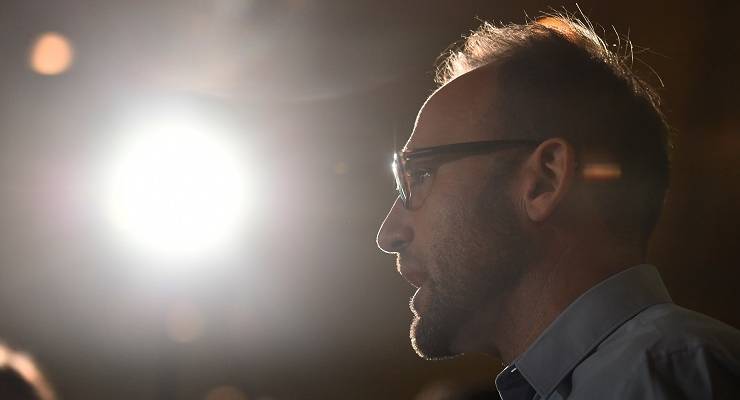
Lost amid the coverage of the budget last week was a significant announcement by Greens leader Adam Bandt, who declared the party was walking away from the ground-breaking consensus reached by Aboriginal and Torres Strait Islander people through the Uluru Statement from the Heart.
Bandt said the order of the reforms in the Uluru Statement should be changed from Voice, Treaty, Truth and retrofitted to the Greens’ preference of Truth, Treaty, Voice.
The Uluru Statement is an historic cultural and political reform statement — not a lego set that can be taken apart and remodelled on a whim.
This policy shift represents a broken 2019 election commitment when the Greens promised to “provide $183 million for the consultation and referendum process to establish a representative body like a Voice to Parliament”.
Just a year on, this commitment has now been jettisoned in favour of the Greens’ new position that has been developed without any serious engagement with Aboriginal and Torres Strait Islander people, certainly nothing like the depth or scale of the process that led to the Uluru Statement.
Indeed, the Aboriginal and Torres Strait Islander leaders who worked tirelessly for years to build a multi-partisan consensus on constitutional reform did not even warrant a courtesy call about the policy shift. They learned about it in the news.
This is not just a cosmetic reordering. It is a policy announcement by the third force in Australian politics that has lasting implications for Aboriginal and Torres Strait Islander people.
Prioritising truth-telling may have the appeal of apparent moral urgency, but it fundamentally misunderstands what Aboriginal and Torres Strait Islander people know: of the three reforms, truth-telling is the hardest and will likely take generations to fulfil.
Real truth-telling is not the kumbaya version where we share a few stories around a fire or dedicate an annual week of reflection, but a deep, searching examination of the cultural, social, and most importantly, institutional truths that underpin Australia’s understanding of its own history, its relationship with Aboriginal and Torres Strait Islander people, and how that manifests in our present.
Aboriginal and Torres Strait Islander people are not victims tethered to our past, but as the great poet and Elder of my people Oodgeroo Noonuccal wrote, “the past is all about us and within”.
The impact of the past plays out in our present through the education, health, welfare and justice systems that cause disproportionate physical, mental, emotional and spiritual harm to too many Aboriginal and Torres Strait Islander people.
You can hear it in the plaintive cry of the Uluru Statement:
“Proportionally, we are the most incarcerated people on the planet. We are not an innately criminal people. Our children are aliened from their families at unprecedented rates. This cannot be because we have no love for them.”
Australia does not currently have the institutional crucible to hold the necessary heat to forge a more truthful and just expression of our shared nationhood.
A royal commission is one of our nation’s most powerful mechanisms for truth-telling, yet as we approach the 30-year anniversary of the inquiry into Aboriginal deaths in custody, Aboriginal and Torres Strait Islander people are still dying in watchhouses and prisons at a rate of one person every three weeks.
We do not suffer a lack of moral righteousness on these issues. The “torment of our powerlessness”, as described in the Uluru Statement, is our status as an extreme minority that is unable to effectively and consistently influence the institutions and systems that determine the policy and legislative responses that disproportionally impact our people.
Without the foundational structural and institutional reform, truth-telling will be a tick-a-box exercise that changes nothing.
This is why, after months of dialogues across the country involving sessions on civics, history and constitutional law as well as the all-important conversations about political viability, Aboriginal and Torres Strait Islander people prioritised a Voice to Parliament enabled by the constitution in the Uluru Statement.
Granted, it doesn’t evoke the poetic possibility of truth-telling or animate the long-held passion for treaties. But a Voice responds to the most foundational need for Aboriginal and Torres Strait Islander people to influence real change: structural empowerment.
A Voice to Parliament enabled by the constitution provides a practical and fair means for Aboriginal and Torres Strait Islander people to effectively influence policy and laws while creating the institutional scaffolding from which treaties and truth-telling can be constructed.
Aboriginal and Torres Strait Islander people created a cultural, intellectual and political masterpiece through the Uluru Statement from the Heart that is an invitation to “walk with us in a movement of the Australian people for a better future”.
Walk with us. Don’t tell us yet again where to go.








How can there be truth telling while you deny Indigenous people a voice? Ahh yes, that’s right …… you can have MY truth.
Strange that this policy change seems to coincide with the appointment of the new Green’s senator for Victoria…following the retirement of their federal leader…who I understand is a young indigenous woman.
Did the new senator consult with those who were instrumental in shaping the Uluru Statement from the Heart…or is this all her own work?
If the latter, how presumptuous of her to suggest she can speak for ALL indigenous people in this country. And typical Green behaviour!!
Pure speculation.
please post a link to the policy, it appears there is not a new policy and it would be great to see where your information comes from…
It’s all about economics. Only a Job guarantee (see MMT) can lift all aboriginal people out of poverty, and hence ‘close the gap’.
How is it not the essence of racism that only those claiming to be indigenous are allowed to decide what the consanguineous want?